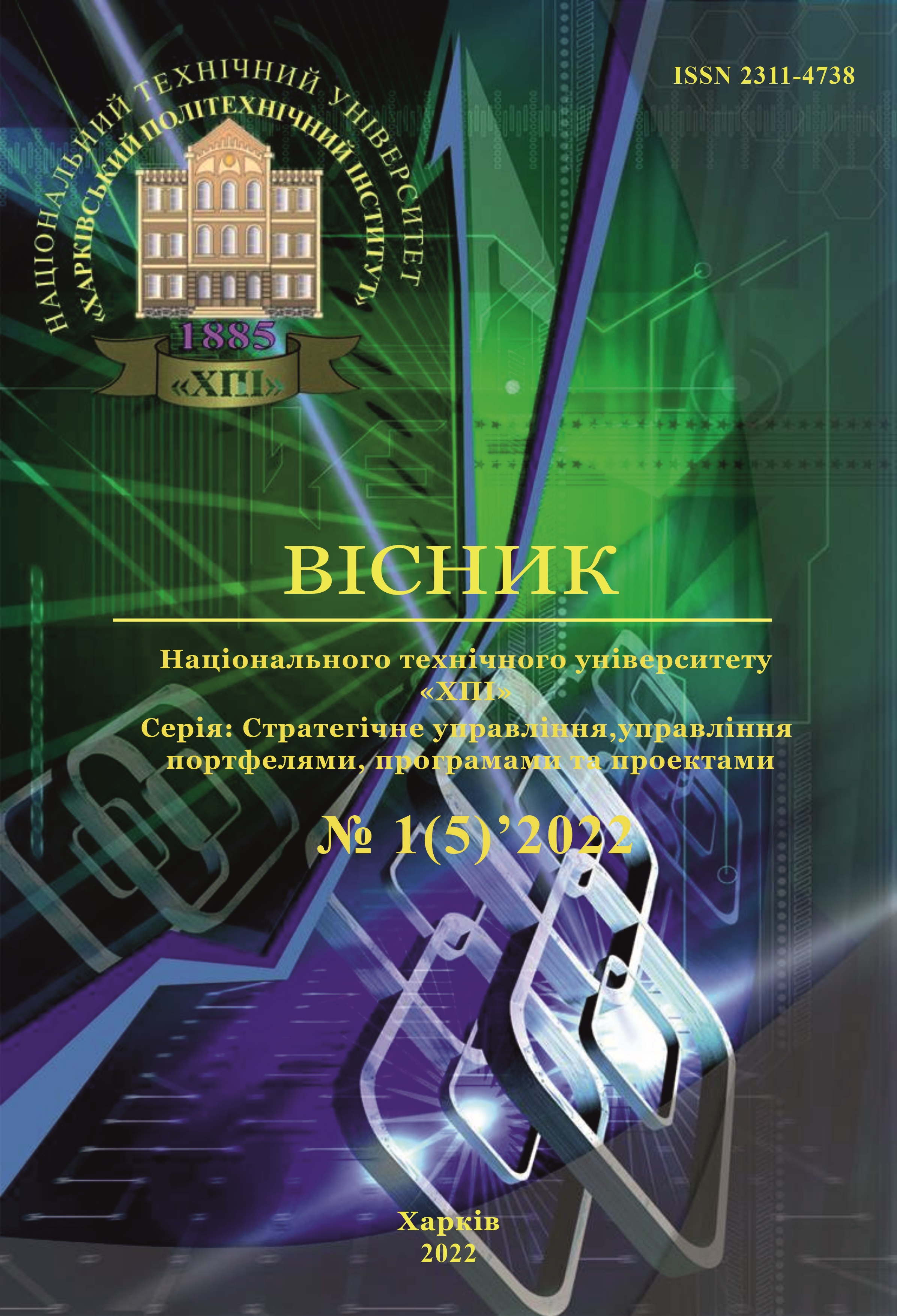INFORMATION AND ANALYTICAL SUPPORT OF GENDER AUDIT OF EDUCATIONAL MANAGEMENT SYSTEM
DOI:
https://doi.org/10.20998/2413-3000.2022.5.9Keywords:
gender mainstreaming; maturity management; gender maturity of educational management; gender audit, STEMAbstract
Contemporary requirements for a gender-responsive educational management system with an emphasis on the STEM industry is outlined. The need for the use of gender audit of higher education institutions (HEI) is indicated. It is noted that the management system should be capable of greater integration of gender-sensitive components. A matrix of parameters of gender maturity of the organizational system of HEI is proposed. It includes five basic principles of gender equality defined by the World Economic Forum (“gender equality in the workplace”, “gender-balanced management”, “gender-equitable organizational processes”, “promoting equal participation of women and men in decision-making”, “promoting development of the leadership potential of women”). The contextual requirements for a gender-responsive educational management system are structured. G. Kerzner's project management maturity model was applied to improve the author's method of measuring gender activity in HEI. The results of an experimental study of assessing the gender maturity of the management system are presented on the example of Ukrainian universities.
References
Universities’ Strategies and Approaches towards Diversity, Equity and Inclusion : Examples from across Europe / ed. A. Claeys-Kulik, T. Ekman Jørgensen. Brussels: European University Association, 2018. 58 p.
The STEM Gap: Women and Girls in Science, Technology, Engineering and Mathematics. American Association of University Women (Outline). URL: https://www.aauw.org/resources/research/the-stem-gap/ (дата звертання: 19.12.2021).
Методологія та критерії проведення гендерного аудиту закладів освіти. Міністерство освіти і науки України, наказ від 05.11.2021 № 1182 (Outline). URL : https://mon.gov.ua/ua/npa/pro-zatverdzhennya-metodologiyi-ta-kriteriyiv-provedennya-gendernogo-auditu-zakladiv-osviti. дата звертання: 19.12.2021).
План заходів з реалізації зобов’язань Уряду України, взятих в рамках міжнародної ініціативи «Партнерство Біарріц» з утвердження гендерної рівності (затверджено розпорядженням Кабінету Міністрів України від 16 грудня 2020 р. № 1578-р.). Верховна Рада України (Outline). URL: https://zakon.rada.gov.ua/laws/show/1578-2020-%D1%80#Text (19.12.2021).
Equality Means Business: WEPs Brochure. United Nations Entity for Gender Equality and the Empowerment of Women. New York, 2021. 84 р.
Institutional Transformation : Gender Mainstreaming Toolkit. European Institute for Gender Equality (EIGE). Luxembourg. 2016. 67 р.
Fesenko Т. G. Gender Mainstreaming as a factor of project management maturity. Управління розвитком складних систем. – 2015. № 23. С. 5–10.
Global education monitoring report 2020: gender report. A new generation: 25 years of efforts for gender equality in education. UNESCO, 2020. 84 р.
Peterson H. Academic ‘Glass Cliff’? Exploring the Increase of Women in Swedish Higher Education Management Athens. Journal of Education, 2014. Vol. 1, Issue 1. P. 33–44.
Guidance for developing gender-responsive education sector plans. New York, 2017. 159 p.
ECU’s Athena SWAN Charter Awards Handbook May 2015. 32 p. URL: https://www.ecu.ac.uk/wp-content/uploads/2015/05/ECU-Handbook-26.05. 15-FINAL.pdf. (дата обращения 19.12.2021).
Фесенко Г. Г., Шахов А. В., Фесенко Т. Г., Якунін А. В. Моніторинг системи освітнього менеджменту за моделями оцінки гендерної зрілості (на прикладі університетів України). Вісник Національного технічного університету «ХПІ». Сер. : Стратегічне управління, управління портфелями, програмами та проектами. 2020. №1. С. 68–77. doi: 10.20998/2413-3000.2020.1.10.
Fesenko Т., Fesenko G. Developing gender maturity models to project and programme management. Eastern-European Journal of Interiorise Technologies. 2017. № 1/3(85). –Р. 46–55. doi: 10.15587/1729-4061.2017.28031.
Kendall G. I., Rollins S. C. Advanced project portfolio management and the PMO multiplying ROI at wrap speed. London : Transatlantic, 2003. 434 p.
Fesenko T., Shakhov A., Fesenko G. Modeling of maturity of gender-oriented project management office. Eastern-European Journal of Interiorise Technologies. 2017. –Vol. 5, № 3(89). Р. 30–38. doi: 10.15587/1729-4061.2017.110286.
UCL Equality, Diversity & Inclusion Strategy 2015–2020. University College London. 2015. URL: https://www.ucl.ac.uk/human-resources/sites/human-resources/files/edi_strategy_2015-2020.pdf. (19.12.2021).
Фесенко Г.Г. «Дитячий простір» в філософсько-урбаністичній інтерпретації. Гілея: науковий вісник: Збірник наукових праць. 2017. Вип. 117. С. 180–184.
Фесенко Г. Формування гендерної компетентності української еліти. Українознавчий альманах, 2013. Вип 14. С. 119–121.
Fesenko T., Fesenko G., Bibik N. The safe city: developing of GIS tools for gender-oriented monitoring (on the example Kharkiv city, Ukraine). Eastern-European Journal of Interiorise Technologies. 2017. № 3/2(87). Р. 25–33. doi: 10.15587/1729-4061.2017.103054
Fesenko T., Shahov A. , Fesenko G. , Bibik N. , Tupchenko V. Modeling of customer-oriented construction project management using the gender logic systems. Eastern-European Journal of Interiorise Technologies. 2018. Vol. 1. № 3(91). Р. 50–59. doi: 10.15587/1729-4061.2018.123124.
Центр гендерної освіти Харківського національного університету радіоелектроніки. URL: https://nure.ua/branch/tsentr-gendernoyi-osviti. (дата звертання : 19 грудня 2021).
Downloads
Published
Issue
Section
License

This work is licensed under a Creative Commons Attribution-NonCommercial-ShareAlike 4.0 International License.
Our journal abides by the Creative Commons copyright rights and permissions for open access journals.
Authors who publish with this journal agree to the following terms:
Authors hold the copyright without restrictions and grant the journal right of first publication with the work simultaneously licensed under a Creative Commons Attribution-NonCommercial-ShareAlike 4.0 International License (CC BY-NC-SA 4.0) that allows others to share the work with an acknowledgement of the work's authorship and initial publication in this journal.
Authors are able to enter into separate, additional contractual arrangements for the non-commercial and non-exclusive distribution of the journal's published version of the work (e.g., post it to an institutional repository or publish it in a book), with an acknowledgement of its initial publication in this journal.
Authors are permitted and encouraged to post their published work online (e.g., in institutional repositories or on their website) as it can lead to productive exchanges, as well as earlier and greater citation of published work.

